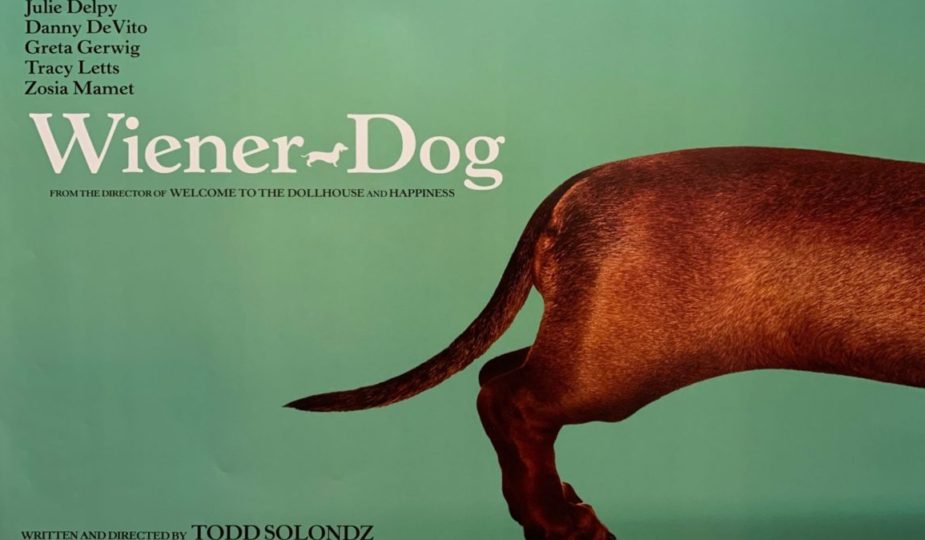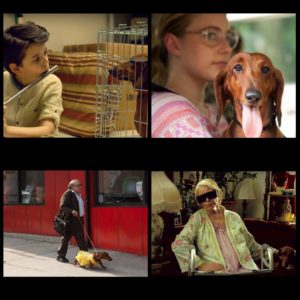
Wiener-Dog (2016)
There are three hitchhikers sitting in the back seat; Mexican immigrants in mariachi suits looking dimly into space. A girl with big glasses (Greta Gerwig) turns around euphorically to them and asks the men how life is in the USA. Without looking back, one of them replies sadly: “The USA is like a big, fat elephant drowning in a sea of despair.”
The American director Todd Solondz has a faible for characters in hopeless situations. Humiliation is a part of everyday life for them, and when they protest against it, they quickly make a fool of themselves. Many films, mostly sober and socially realistic, make it their business to depict the depravity of the world. Solondz’s works have a similar agenda but differ in their tendency towards artificial and decorative atmospheres. As gray as it may be inside his character’s hearts, the pictures shine bright as candy colors. Another unique selling point is that Solondz tells his stories with a dark, socially conscious satire. This can be seen in films such as Welcome to the Dollhouse (1995), Happiness (1998), Palindromes (2004) and Life During Wartime (2009). Solondz’s underrated work has received critical acclaim for its commentary on the “dark underbelly of middle class American suburbia”, a reflection of his own background in New Jersey.
 Wiener-Dog (2016) begins with a dachshund being sent to a foster care kennel. Once there, he is confined in a small glass cage. The dog goes from one weird, dysfunctional and unsuitable owner to another. One of them doesn’t like dogs, another one is depressed, and they all make the animal feel the setbacks of their problematic lives. Each owner is further down the road of life, they struggle inside a rabbit hole, looking for something that gives meaning to their lives, and the dog witnesses the passage of time. The film is, so to speak, the American Indie variant of Robert Bresson‘s Au hasard Balthazar (1966), albeit less ascetic and much more complacent and cynical. Instead of a donkey, it is a dachshund that is constantly changing hands and revealing a number of different failed existences.
Wiener-Dog (2016) begins with a dachshund being sent to a foster care kennel. Once there, he is confined in a small glass cage. The dog goes from one weird, dysfunctional and unsuitable owner to another. One of them doesn’t like dogs, another one is depressed, and they all make the animal feel the setbacks of their problematic lives. Each owner is further down the road of life, they struggle inside a rabbit hole, looking for something that gives meaning to their lives, and the dog witnesses the passage of time. The film is, so to speak, the American Indie variant of Robert Bresson‘s Au hasard Balthazar (1966), albeit less ascetic and much more complacent and cynical. Instead of a donkey, it is a dachshund that is constantly changing hands and revealing a number of different failed existences.
In the first passage, nine-year-old Remi (Keaton Nigel Cooke) receives the dog as a gift from his father (Tracy Letts). The dog is an attempt to comfort the boy as he recovers from an unspecified type of cancer; his mother (Julie Delpy) is less than satisfied. In a matter of minutes, the suburban discontent that seeps into many Solondz films reaches ridiculous peaks, and the boy inadvertently makes the dog sick. The punchline goes on and on until it stops being funny and turns into a strange kind of poetry. A climactic discussion between the boy and his mother about the nature of mortality follows this, leading the little one to conclude that “death is a good thing”. Highly dense in philosophy and equally ridiculous, this story sets the stage for the solemn chapters to come. In the second one, Solondz resurrects his most famous creation, Dawn Wiener (a character initially seen in Solondz’s debut Welcome to the Dollhouse, and now played by Greta Gerwig), a lonely veterinary technician which adopts the dog. Dawn takes care of the dachshund until he regains his health back, eventually taking him to a neighborhood convenience store, where she meets her former classmate Brandon (Kieran Culkin). With nothing better to do, she follows him on a road trip that leads to the house of Brandon’s mentally disabled relatives. The sequence becomes increasingly tender and strange, culminating in a final gesture that appears to be one of Solondz’s most idealistic moments. But like everything in the filmmaker’s gloomy vision, it is short-lived: Wiener-Dog tracks the ephemeral nature of a world defined by an eternal discomfort.
Later, Solondz interrupts the film with a scandalous and weird intermission of an original Western-style theme song titled “The Ballad of the Wiener Dog”. This is the first indication of the filmmaker’s cynical perspective on the desire for pure entertainment which defines our modern society, but the punches keep coming. The most depressing chapter revolves around the disgruntled film school teacher Dave Schmerz (Danny DeVito), a one-time successful screenwriter that has fallen into decadence: his students don’t respect him anymore, and his agent largely dismisses him… the dog appears to be the only light in his life.
 Inside Dave’s character we find glimpses of Solondz himself (an adjunct professor in NYU at that time), and we also picture this kind of story unfolding for tons of Hollywood’s original voices and one-hit wonders. DeVito’s wrinkled brow perfectly encapsulates the neurotic fury at the heart of Solondz’s work, and his role’s attempt to engage with indifferent students who find him uninspiring. Finally, the film gathers the full weight of its anger and hilariousness in the final scenes. The dog now belongs to an angry old grandmother (Ellen Burstyn) who is visited by her spoiled granddaughter Zoe (Zosia Mamet) and her new boyfriend, Fantasy (Michael James Shaw). Their interactions unfold with long pauses and sinister looks that could be mistaken for outright comedy if they weren’t so inherently grim. “Make no mistake,” the grandmother tells the younger woman about her prospects in her life. That statement reaches a fever pitch in a climactic sequence that marks one of the strangest and most fantastic moments of Solondz’s entire filmography, and that’s saying a lot.
Inside Dave’s character we find glimpses of Solondz himself (an adjunct professor in NYU at that time), and we also picture this kind of story unfolding for tons of Hollywood’s original voices and one-hit wonders. DeVito’s wrinkled brow perfectly encapsulates the neurotic fury at the heart of Solondz’s work, and his role’s attempt to engage with indifferent students who find him uninspiring. Finally, the film gathers the full weight of its anger and hilariousness in the final scenes. The dog now belongs to an angry old grandmother (Ellen Burstyn) who is visited by her spoiled granddaughter Zoe (Zosia Mamet) and her new boyfriend, Fantasy (Michael James Shaw). Their interactions unfold with long pauses and sinister looks that could be mistaken for outright comedy if they weren’t so inherently grim. “Make no mistake,” the grandmother tells the younger woman about her prospects in her life. That statement reaches a fever pitch in a climactic sequence that marks one of the strangest and most fantastic moments of Solondz’s entire filmography, and that’s saying a lot.
Todd Solondz says that his films are often not understood in the way he wants them to. Everything about this film is critical, scathing, intelligent, and sarcastic. A visceral tape that bites directly into Western society through a connecting thread in the shape of a dachshund. A criticism of vanity, the stereotype of family, contemporary art, winners and losers. Wiener-Dog may be less shocking and acclaimed than some of Solondz’s earliest works, but it may very well be one of his most accomplished films to date.
by Octavio Carbajal González

Just saw this yesterday, what a funny and strange little movie !!. The intermission and the last story, OMG
Cheers Adriana, thanks for reading.
We’re on the same channel, I laughed a lot with the last story and the intermission. Great stuff.
Octavio,
I’ve only seen Welcome to the Dollhouse a long time ago. You’ve written another perceptive film review which intrigues me to check out this movie sometime.
Hey Mark,
Thanks for reading !. This is the direct and contemporary sequel to “Welcome to the Dollhouse”. You’ll notice plenty of similarities with the “modern” world in this film… it absolutely feels like a millenial/gen Z achievement.
Hello! I’m not fan of this movie, but your review is grest!
Hi Octavio. Once again a fascinating writing about an interesting film. Great choice. I haven’t seen Wiener Dog yet. His ”Happiness” is awesome movie.
Thanks for your valuable opinion, Mika.
Wiener-Dog may not reach the heights of Solondz’s ’90s essentials: Welcome to the Dollhouse and Happiness (also my personal favorite). But, it feels like a breath of fresh air in times when cinema has become a severe wasteland. Wiener-Dog stands apart in these times of “selfie” productions and bloated narcissistic super-hero movies.
Cheers from here to Finland
Your review is much better than the film imho. But you either love it or hate it.
Thanks for your kind words, Bill.
I stand on the first side!
Road trip of a dachshund through crystal meth America
The rotten underground that lives beneath the “perfection” of American Suburbia. Crystal meth is one of USA’s contemporary catastrophes!
I’m not fan of this movie, but your review is great!
Cheers, Enigel. Thank you for taking the time to read.
Hey Saliha,
To be honest with you, I wasn’t expecting too much about this one… When I first saw it, my preconcieved expectations were completely crushed. This film was one of the most pleasant surprises that I’ve had in a very long time.
I believe that Solondz still holds his place as one of the most unique and challenging independent filmmakers out there. I honestly don’t see why too many people seem to hate his work. I highly recommend this film.
I also disliked “Au Hasard Balthazar”, but I didn’t hate it. Still, I don’t understand the insane praise from critics/public. In my humble opinion, Bresson has much more interesting films.
I loved Welcome to the dollhouse, intrigued to see this after your review!
Thanks, Jean
Welcome to the Dollhouse is also one of my absolute favorites, I haven’t seen a more accurate depiction of the dark side that lives beneath the high school years… But, “Happiness” still holds the crown for me.
Hope you enjoy Wiener-Dog!
Granola bar!!
The tragedy!!
I love this one. His films are so bizarre. Great review!
Thanks for reading, Karl!
I strongly believe that Solondz needs more recognition, he’s still underrated…
The four stories of this film are filled with very strong statements about the human condition.